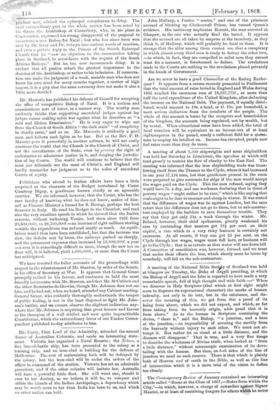Politicians who attend to Italian affairs have been a little
surprised at the clearness of the Budget introduced by Count Cambray Digny, a gentleman known chiefly as an agreeable courtier. We are informed, however, that the Count, who has the rare faculty of knowing what he does not know, makes of him- self as Finance Minister a funnel for S. Bastogi, perhaps the best financier in Italy. He read his Budget in the Chamber, and read also the very excellent speech in which be showed that the Italian revenue, without reckoning Venice, had risen since 1861 from 20,600,0001. to 28,700,0001—an increase of eight millions sterling —while the expenditure was reduced nearly as much. An equili- brium would thus have been established, but that the increase was slow, the deficits met by loans, the railways pushed on sharply, and the permanent expenses thus increased by 12,000,0001. a year —a sum it is exceedingly difficult to meet, though the new tax on flour will, it is believed, yield 4,000,0001., or more than the Count has anticipated.


































 Previous page
Previous page